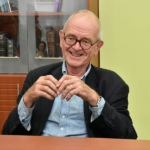‘‘It’s very painful to lose people in war, but losing culture and history is a tragedy too"
Victoria Amelina is a writer from Lviv, Ukraine. She is the author of the novels “Fall Syndrome” and “Dom’s Dream Kingdom”. The latter book, published in 2017, won the Best Book of the Year award at the Zaporizhzhya Book Fair, and was shortlisted for numerous awards, including: LitAkcent Book of the Year, Lviv City of UNESCO Literary Award and the European Union Prize for Literature.
Is Russia aiming to destroy Ukrainian culture?
Everyone was shocked when the Russians at the beginning of this war bombed the museum in Ivankiv, an urban settlement in the Kyiv Oblast. It contained the paintings of many famous artists, including the work of Maria Prymachenko. This is one of our worst fears. It’s very painful to lose people in war, of course. But losing culture and history is a tragedy too. Russians keep trying to punish us for having this history, and for being Europeans.
There was a poignant photo that emerged in the media after Russian troops left the town of Bucha, near Kyiv, back in late March. It showed a dead woman’s hand, with a key chain next to it, which displayed a symbol of the European Union . . . She thought that the European Union was her home. But Europe did not save her.
What is behind the efforts to undermine a distinct Ukrainian identity?
The Russian Federation hates Ukraine because the country has managed to become democratic. We have true elections. We are, you could say, obsessed about our freedom, and we’re ready to die for it. Russians cannot forgive us for that.
We now have a very black joke here in Ukraine that if we don’t like some building, we should just write the word “children” on the building, because we know the Russians will destroy it. They act like terrorists. Russian officials keep warning Ukrainians that cities that do not surrender, like Kyiv and Lviv, will be completely destroyed, like Mariupol was. I’m sure Russia will attempt to keep bombing our historical and cultural sites.
Is there a historic precedent for this?
In the 1920s there was a renaissance of Ukrainian culture, which for some time the Soviet regime allowed to flourish. Ukrainians were able to publish texts, and plays were allowed to run in theatres. There was an apartment building where some of the best writers in Ukraine all lived: the Slovo building in Kharkiv. Most of its inhabitants have since become known as “the Executed Renaissance”. They were arrested by [the Soviet secret police] and executed. That wiped out about 90 per cent of the best writers in Ukraine.
Has the Russian government acknowledged these past abuses?
[After the fall of the Soviet Union] there was no attempt to understand what went wrong in their history. On the contrary, the Russian government has prosecuted the few individuals who were brave enough to talk about shameful episodes of their history. Take, for example, the graves [of the executed Ukrainian writers]. A historian named Yury Dmitriev, who took care of these graves, was arrested. He is, I believe, currently still in prison in Russia.
Why do so many Russians appear to believe the government’s propaganda on Ukraine and its past?
The propaganda the Russian government uses is not even consistent. But Russians want to believe these lies. Unfortunately, the roots of it are very deep. They have an imperial mindset. This insinuates that it could not possibly be true that Ukrainians could have built a democratic state, or that they could have visa-free travel to Europe, or that Ukrainians are flourishing, and they are ready to be with Europe. It just doesn’t fit into the picture of the world the Russians have. This is cognitive dissonance. They want to keep believing that they are saving the world. They believed they saved Georgia, after the 2008 invasion.
They did the same in Chechnya [with two wars there from 1994 to 2000], where Russia committed a genocide. Russians are proud of that. They cannot see what is wrong with
this history.
Ukraine became part of the USSR in 1922 and independent in 1991. Meanwhile, its borders changed multiple times during Soviet rule. How do Ukrainians deal with that complicated history?
Under any [totalitarian] regime you get used to it, and you more than cooperate. You become part of this regime. In my novel Dom’s Dream Kingdom, I used the story of my grandfather. He was a Soviet military pilot. He became part of the Soviet regime. But he was from the east of Ukraine, where the Holodomor [now recognised in Ukraine as an act of genocide] occurred. His family were victims of the that man-made famine, and he had terrible memories about that. I also remember my grandfather explaining to me the fear he felt if the Soviet army could potentially send him to Czechoslovakia in 1968.
But regimes force people to do terrible things. As a Ukrainian I felt there was something wrong with that, and I should be somehow even ashamed. This is not what is happening in Russia today. There is no shame. They are proud of their victories, and they believe they’re the
saviours of Europe.
“Dom’s Dream Kingdom” is set in Lviv, in the childhood home of science-fiction writer Stanislaw Lem. Why did you choose this setting?
It’s important to talk first about the history of Lviv, after the Second World War, when the population changed drastically. In 1939 we had more than [150,000] Jews living in Lviv [then known by its Polish name, Lwów]. After the war less than [one percent] of Jews survived. Stanislav Lem was a Polish author of Jewish origin. He suffered under Nazi occupation [and later went to Krakow in Poland]. He had survivor’s guilt there for all his life.
Researchers in Poland and Ukraine now point out that novels like Solaris, and other books written by Lem, were not just random fictional stories. They were, in a way, his attempt to understand what happened to him during those years of occupations. Because the Lviv Lem lived under had three occupations. The Soviet Union occupied Lviv in 1939. Then the Nazis occupied the city in [June 1941]. Then the Soviets once again [in 1944].
The 2014 Euromaidan revolution was a turning point for Ukraine, and your novel “Fall Syndrome” explores the lead-up to it. What changed?
In 2014 we stopped having doubts about ourselves as Ukrainians. I was born in 1986, the year Chernobyl happened. As a child I witnessed the collapse of the Soviet Union. It was one thing in 1991, when the majority of Ukrainians voted for being independent. But it was drastically different when we were ready to fight for it in 2014. When Russia then started a war immediately after that [in eastern Ukraine] we showed that we would not support a puppet government in Kyiv.
But what’s happening now is the Russians showing their true face. They show they are ready to kill women and children, and then pretend afterwards that it didn’t happen. It’s yet another level. I don’t know what will happen tomorrow.
You work closely with PEN Ukraine. What does your work involve?
Right now, PEN Ukraine is helping to evacuate writers from certain parts of Ukraine, where their lives are in danger. I am part of the so-called PEN security initiative that is helping with this. I have been reiterating the same point since the war began, when talking to an international
audience:
I know you support us in Ukraine now, but please, stay with us – not for a day, not for a week, not for a month, stay with us until victory, or until we are all dead, because this is what is at stake, I’m afraid.


